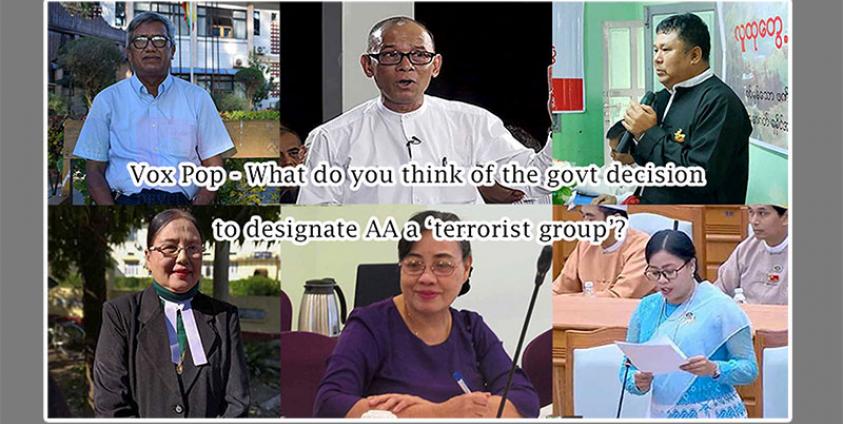On March 23, the Myanmar government designated the Arakan Army as a terrorist group and unlawful association. DMG sought the opinions of politicians, political analysts and legal experts about what could prove to be a major development in Myanmar’s peace process, and its potential implications for the conflict dynamics at play in Arakan State.
Compiled by Khaing Roe La

Saw Mra Razar Linn (senior leader of the Arakan Liberation Party)
In the past, the government declared each armed group to be an unlawful association. After signing the ceasefire in 2015, signatories were removed from being unlawful associations. However, some organisations have not yet signed the ceasefire. So, we always urge the government to start negotiations with these groups.
We have to search for a solution via the negotiating table. I especially want them all to gather around the table for peace after they can get a solution to the military problem. I want the Arakan Army to come to the table to talk. So, I am worried that a declaration as a terrorist organisation could push the AA far from the peace negotiating table.

U Maung Maung Soe (ethnic affairs analyst)
The government always declares ethnic armed groups that are undertaking armed struggle to be unlawful associations. It is not unusual. The NCA [Nationwide Ceasefire Agreement] signatories were removed from the list of unlawful associations after signing the ceasefire.
Regarding the declaration as a terrorist organisation, it’s a difficult thing to analyse. I think the government declared the AA as a terrorist group to control its financial resources because the government can do that with the help of international organisations.
But the sad thing is that the fighting between the Tatmadaw and the AA has become fierce and they are far from the path to peace due to the declarations of ‘terrorist group’ and ‘unlawful association’. I feel sad that the declarations were made while the country is facing the threat of a coronavirus outbreak.

Daw Htoot May (Amyotha Hluttaw MP)
We have historical evidence that some ethnic people have undertaken armed struggle because their rights were lost while they were living in Myanmar when a federal system was practiced since the country gained independence [from 1948-1962]. The reason ethnic people are choosing armed struggle is to receive equality.
The current Myanmar is not a real democratic country. Ethnic people have been able to establish their own political parties since 2010, and the Parliament was [elected and subsequently convened] around that time.
The basis of the armed struggle in Myanmar is for the rights of ethnic nationals. It is to have federalism and democracy. When there was no right to establish a political party, some ethnic nationals chose armed struggle and demanded self-administration. So, we need to solve the root causes of the problem. Declaring ethnic armed groups as this or that name cannot bring good prospects for the country.
We were trying in Parliament to enact federalism, but as you all know, no amendments could be made, even just [adding] the word ‘federal’. There is no future of establishing federalism in Myanmar if we do not solve basic political problems. I must conclude that the recent situation cannot be resolved without addressing the roots of why ethnic people are undertaking armed struggle.

U Mya Aye (leading member of the Federal Democratic Force)
Currently, our country is far from establishing a federal union. It is a time when armed conflicts are occurring in Arakan State. Meanwhile, Myanmar is facing the COVID-19 pandemic. The most important thing in such a moment is national unity, I believe.
The effect of the government’s declaration [of the AA as a terrorist group and unlawful association], at a time when we should be establishing national unity, could make the government and the AA far from each other. The AA has received Arakanese people’s support. I think both sides should search for a way to reduce fighting because declaring each other terrorists does not work toward reaching a solution. I do not like that situation. I want them to negotiate because it is a critical time for the country.

Daw Aye Nu Sein (lawyer)
There have been cases in which charges were brought against the ULA [United League of Arakan]/AA five years ago. At that time, charges were filed against the AA as a group under the KIA [Kachin Independence Army].
At that time, the accused were charged under section 17(1) and (2) of the Unlawful Associations Act. At the beginning of 2018, there were charges filed under section 17(1) and (2). But most cases were dropped before bringing them to court.
Later, the Counter-Terrorism Law has been used to file charges. The law was enacted in 2014. The filed charges allege support for the AA, or doing activities for the AA at the asking of the AA. Such types of charges can be seen throughout Arakan State, especially in Sittwe, Mrauk-U and Maungdaw districts. One case being prosecuted under the Counter-Terrorism Law has also been seen in Mandalay. The AA was declared a terrorist group on March 23. So, we have to consider whether such charges that have been filed before the declaration can be brought under the Counter-Terrorism Law because the Constitution says laws cannot be applied retroactively.
People in war-affected areas are now facing the negative consequences of war, such as all houses in a village set on fire and people being killed. The number of internally displaced people has reached into the hundreds of thousands. Meanwhile, people have to face food shortages amid concerns about the coronavirus pandemic. All events were suspended to prevent COVID-19 spread, but not war. People were killed and villages were burnt to ash under the catchphrase ‘to crack down on terrorism’. The hostilities are still intensifying. War will not end as long as the parties involved in the fighting will not stop it. We have to wait and see if war will stop or not.

U Hla Myint (information officer for the Arakan League for Democracy)
I think the declaration is to escalate the armed conflict in Arakan State and to oppress the armed group. In other words, the government is using all means to crack down on the armed group because facing off against it has not been as easy as was expected.
It is a warning to people who are from the war-affected area that they will face more hardship and more trouble due to the intensified conflict.
The declaration means the government decided not to negotiate with the armed group. The declaration symbolically expresses that the two sides cannot negotiate. To lessen that tension, a third party that is more powerful than the two groups needs to intervene.
People living in war-affected areas are humans. Humans can understand the troubles of fellow humans. So, people need to show their sympathy with kind-hearted mentalities. If there is no kindness and compassion, the future of the union will not be beautiful and harmonious.
Talks cannot be made because of the declaration; given the current situation. But it depends on them. If they change their mind, the situation will be better.








